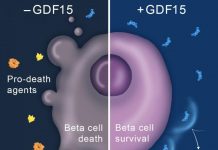Tresiba has been approved by the FDA for both type 1 and type diabetes, marking the first new basal insulin molecule to be approved by the FDA in 10 years.
Novo Nordisk announced (on 9/25/2015) that the U.S. Food and Drug Administration (FDA) approved the new drug application for Tresiba® (insulin degludec injection), a once-daily, long-acting basal insulin. Tresiba® is indicated for use alone, or in combination with oral antidiabetic medicines or bolus insulin, and is approved for glycemic control in adults with type 1 and type 2 diabetes.

Tresiba® provides a long duration of action beyond 42 hours.1 While patients are encouraged to take their insulin at the same time each day, Tresiba® allows patients to dose at any time of the day.1
“Since 1923, Novo Nordisk has been committed to advancing insulin therapy for patients with diabetes, and we are proud to bring forward the first new basal insulin molecule to be approved by the FDA in 10 years,” said Jesper Høiland, president of Novo Nordisk in the U.S. and executive vice president of Novo Nordisk A/S. “Novo Nordisk is excited to launch Tresiba® in the United States in the first quarter of 2016.”
Continue Reading Below ↓↓↓
The approval is based on data from the BEGIN® clinical trial program and includes an interim analysis of DEVOTE, the cardiovascular outcomes trial for Tresiba®. The BEGIN® clinical trial program includes nine randomized, controlled, treat-to-target, open-label trials in patients with type 1 and type 2 diabetes from over 40 countries.2
The FDA concluded based on the provided data that Tresiba® improves glycemic control, achieving comparable A1C reductions (noninferiority) to FDA-approved comparators.2 The most common side effect in BEGIN® was hypoglycemia.
Tresiba® will be available in the FlexTouch® pen, which has no push-button extension, and will be offered in two concentrations enabling maximum doses of 80 units and 160 units per single injection, respectively.1 Tresiba® also offers other patient benefits such as eight weeks of in-use time at room temperature.1
“Managing blood sugar levels is a daily challenge for many people living with diabetes,” said Chris Sorli, M.D., Chair, Department of Diabetes, Endocrinology and Metabolism, and Medical Director of Diabetes Services, Billings Clinic, Billings, MT. “This new treatment option will provide patients with a new way to help control their blood sugar.”
“After seeing the impact Tresiba® has had on patients worldwide, we look forward to bringing it to those living with diabetes here in the U.S.,” said Todd Hobbs, M.D., U.S. chief medical officer, Novo Nordisk. “With its long-acting profile, Tresiba® offers a new treatment option for adults living with diabetes who require a basal insulin.”
Indications and Usage
Tresiba® (insulin degludec injection) is indicated to improve glycemic control in adults with diabetes mellitus.
Limitations of Use
Tresiba® is not recommended for treating diabetic ketoacidosis.
Important Safety Information
Continue Reading Below ↓↓↓
Contraindications
- Tresiba® is contraindicated during episodes of hypoglycemia and in patients with hypersensitivity to Tresiba® or one of its excipients
Warnings and Precautions
- Never Share a Tresiba® FlexTouch® Pen Between Patients, even if the needle is changed. Sharing poses a risk for transmission of blood-borne pathogens
- Monitor blood glucose in all patients treated with insulin. Changes in insulin may affect glycemic control. These changes should be made cautiously and under medical supervision. Adjustments in concomitant oral anti-diabetic treatment may be needed
- Hypoglycemia is the most common adverse reaction of insulin, including Tresiba®, and may be life-threatening. Increase monitoring with changes to: insulin dose, co-administered glucose lowering medications, meal pattern, physical activity; and in patients with hypoglycemia unawareness or renal or hepatic impairment
- Accidental mix-ups between basal insulin products and other insulins, particularly rapid-acting insulins, have been reported. To avoid medication errors, always instruct patients to check the insulin label before each injection
- Severe, life-threatening, generalized allergy, including anaphylaxis, can occur with insulin products, including Tresiba®
- As with all insulins, Tresiba® use can lead to life-threatening hypokalemia, which then may cause respiratory paralysis, ventricular arrhythmia, and death. Closely monitor potassium levels in patients at risk of hypokalemia and treat if indicated
- Fluid retention and heart failure can occur with concomitant use of thiazolidinediones (TZDs), which are PPAR-gamma agonists, and insulin, including Tresiba®. Patients should be observed for signs and symptoms of heart failure. If heart failure occurs, dosage reduction or discontinuation of the TZD must be considered
Adverse Reactions
- Adverse reactions commonly associated with Tresiba® are hypoglycemia, allergic reactions, injection site reactions, lipodystrophy, pruritus, rash, edema, and weight gain
Drug Interactions
- Certain drugs may affect glucose metabolism, requiring insulin dose adjustment and close monitoring of blood glucose. The signs and symptoms of hypoglycemia may be reduced or absent in patients taking anti-adrenergic drugs (e.g., beta-blockers, clonidine, guanethidine, and reserpine)
View/Print Tresiba Prescribing Information: Tresiba Prescribing Information (PDF).
References
- Tresiba [package insert]. Plainsboro, NJ: Novo Nordisk Inc; 2015.
- Vora J, Cariou B, Evans M, et al; Clinical use of insulin degludec. Diabetes Res Clin Pract. 2015;4(2):7-29.
- Centers for Disease Control and Prevention. National Diabetes Statistics Report, 2014. http://www.cdc.gov/diabetes/pubs/statsreport14/national-diabetes-report-web.pdf. Accessed September 23, 2015.
- Centers for Disease Control and Prevention. Number (in Millions) of Civilian, Noninstitutionalized Adults with Diagnosed Diabetes, United States, 1980–2011. http://www.cdc.gov/diabetes/statistics/prev/national/figadults.htm. Accessed September 23, 2015.
BEGIN®, FlexTouch® and Tresiba® are registered trademarks of Novo Nordisk A/S. Novo Nordisk is a registered trademark of Novo Nordisk A/S.










